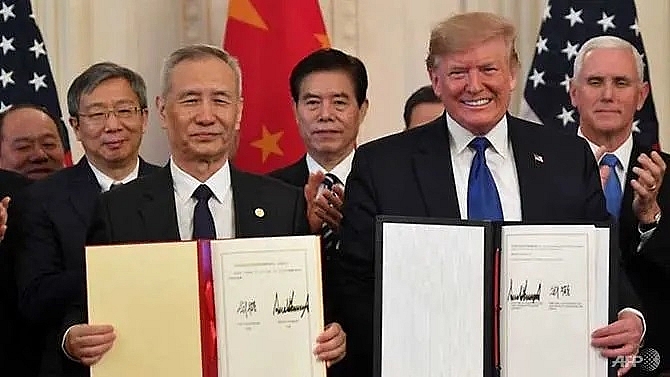What's in the new US-China 'phase one' trade deal?
 |
| Chinese Vice Premier Liu He (left) and US President Donald Trump display the signed trade agreement between the US and China in the East Room of the White House in Washington, DC. (SAUL LOEB/AFP) |
"Today, we take a momentous step, one that's never taken before with China," that will ensure "fair and reciprocal trade," Trump said at the White House before signing the document.
Below are key elements of the text:
CHINA'S PROMISED US SHOPPING SPREE
China has agreed to buy US$200 billion more in US goods over two years than it did in 2017, before the trade war began.
This includes US$32 billion in American farm products and seafood, almost US$78 billion in manufactured goods like aircraft, machinery and steel and US$52 billion in energy goods.
"They're basically saying Chinese consumers and the Chinese economy needs these American products and so the deal will codify that," top White House economic aide Larry Kudlow told CNBC before the signing.
As for whether US farms could fill such giant orders, Kudlow added that while American production is not limitless "we've got plenty of capacity to open the throttle."
The agreement also contains provisions to ease regulatory barriers for trade in infant formula, beef, pork, seafood and agricultural biotechnology.
INTELLECTUAL PROPERTY
The agreement calls for punishment of the theft of trade secrets and for China to formally ban cyber-theft, the unauthorised disclosure of trade secrets and the use of stolen trade secrets.
It also calls for the creation of a mechanism for resolving disputes over medicine patents.
"The definition of criminal offenses regarding theft of IP and related matters is absolutely a crucial ingredient in this," Kudlow said.
There are also provisions to prevent counterfeiting, including counterfeit medicines, and online copyright infringement.
FORCED TECHNOLOGY TRANFERS
US officials and businesses have long alleged that China routinely forced foreign businesses to surrender technological know-how in return for permission to operate in the vast Asian market.
The agreement signed on Wednesday stipulates that neither side will force persons from the other to transfer technology "in relation to acquisitions, joint ventures, or other investment transactions."
FINANCIAL SERVICES
Under the agreement, China will make it easier for US banks to underwrite the debt of Chinese firms and lower barriers to market entry for certain investment services.
Additionally, China agreed to allow US electronic payment services like Mastercard, Visa and American Express to apply to become bank card clearing institutions.
By April of 2020, China is to allow wholly-owned US companies to participate in the life, pension and health insurance sectors.
FOREIGN EXCHANGE
On the campaign trail in 2016, Trump accused China of manipulating its currency to gain unfair trade advantages. Washington earlier this year formally branded Beijing a currency manipulator before dropping the allegation this week.
In the agreement, both sides commit to abide by the International Monetary Fund's principles on avoiding the manipulation of exchange rates and say they will work to achieve market-determined exchange rates and refrain from competitively cutting their value of their currencies.
ENFORCEMENT
The American side long promised any deal would have teeth.
Under the text of the deal, both sides agree that they can formally complain to each other if either feels the other side is not holding to its end of the bargain.
If they are not resolved, complaints will progressively rise up the chain of command to more senior officials.
If disagreements are still not resolved, the complaining side can cease abiding by one of its obligations under the deal.
The side receiving the complaint must not retaliate for such remedies if it believes they have been carried out in "good faith."
If such a measure has been taken in "bad faith," however, "the remedy is to withdraw from this agreement."
What the stars mean:
★ Poor ★ ★ Promising ★★★ Good ★★★★ Very good ★★★★★ Exceptional
 Tag:
Tag:
Related Contents
Latest News
More News
- Russian President congratulates Vietnamese Party leader during phone talks (January 25, 2026 | 09:58)
- Worldwide congratulations underscore confidence in Vietnam’s 14th Party Congress (January 23, 2026 | 09:02)
- Political parties, organisations, int’l friends send congratulations to 14th National Party Congress (January 22, 2026 | 09:33)
- 14th National Party Congress: Japanese media highlight Vietnam’s growth targets (January 21, 2026 | 09:46)
- 14th National Party Congress: Driving force for Vietnam to continue renewal, innovation, breakthroughs (January 21, 2026 | 09:42)
- Vietnam remains spiritual support for progressive forces: Colombian party leader (January 21, 2026 | 08:00)
- Int'l media provides large coverage of 14th National Party Congress's first working day (January 20, 2026 | 09:09)
- Vietnamese firms win top honours at ASEAN Digital Awards (January 16, 2026 | 16:45)
- ASEAN Digital Ministers' Meeting opens in Hanoi (January 15, 2026 | 15:33)
- ASEAN economies move up the global chip value chain (December 09, 2025 | 13:32)






















 Mobile Version
Mobile Version